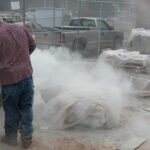Does Due Diligence Apply to Administrative Monetary Penalties for Environmental Violations?

Many jurisdictions let environmental regulators impose administrative monetary penalties (AMPs) for certain environmental violations. AMPs allow the government to fine violators quickly and respond promptly to violations before too much damage is done to the environment. In a standard environmental prosecution, the defendant can raise the due diligence defence. But the environmental laws in several jurisdictions specifically state that due diligence is not a defence to an AMP. In Qubec, the environmental law permits AMPS but doesn’t specifically address whether the due diligence defence applies to them. However, a decision by a tribunal did just address that issue.
THE CASE
What Happened: A company operated a site at which cement concrete, asphalt cement and bricks are converted into backfill. The site could accommodate between 200 and 400 trucks, which used the site’s two access roads daily. To mitigate the dispersal of dust, the company arranged to have tanker trucks spread water on the access roads, and loading and backfill areas. A company employee was responsible for managing dust on the site and would decide whether tanker trucks were needed, based on weather forecasts and his observations. Due to complaints from nearby residents, an inspector from the Ministry of Sustainable Development, Environment and the Fight Against Climate Change went to the site and saw a dust cloud that reached the residential neighbourhood. The employee responsible for dust management wasn’t there at the time but called in a tanker truck after the inspector’s visit. Still, an AMP was issued to the company for the emission of dust in a residential neighbourhood in violation of Sec. 20 of the Environment Quality Act. The Bureau de rexamen des sanctions administratives pcuniaires, which was established to review AMPs, upheld the penalty, so the company appealed.
What the Tribunal Decided: The Administrative Tribunal of Qubec also upheld the imposition of the AMP.
The Tribunal’s Reasoning: The company argued that an AMP wasn’t justified because it had demonstrated due diligence by taking appropriate measures to prevent the release of contaminants, namely dust. And because the AMP would carry a stigma similar to that of a criminal conviction due to the negative publicity, the due diligence defence should be allowed. The Tribunal recognized that the ‘reasonable, prudent and diligent person’ defence that exists in civil law could be applied in the case of AMPs. In addition, it noted that the Environment Quality Act doesn’t bar a defence based on the measures taken to prevent a violation and even includes the measures taken to remedy the violation as a factor the ministry must consider in deciding to impose an AMP.
Thus, the Tribunal applied the ‘reasonable, prudent and diligent person’ defence to the facts of this case. But it found that the company hadn’t acted as a reasonable, prudent and diligent person would have acted in the same circumstances. The company had a duty to prevent, know about and monitor the contamination that it caused. Under its certificate of authorization, it should have taken the necessary measures to ensure that the dust generated by its operations didn’t have the effects barred by the Environment Quality Act, which it didn’t do [Excavation Ren St-Pierre Inc. c Qubec (Dveloppement Durable, environnement, et la lutte contre les changements climatiques), [2015] CanLII 7296 (QC TAQ), Feb. 11, 2015].
ANALYSIS
The good news for companies in Qubec is that this decision represents the first time the Tribunal confirmed that a defence akin to the due diligence defence can be raised when an AMP is imposed. A company hit with a penalty may provide evidence that it had taken the necessary precautions to avoid a violation of the Environment Quality Act, acting as a reasonable, prudent and diligent person in the same circumstances would have acted. For that defence to succeed, the company will have to establish that it not only is aware of and monitors the pollution potentially generated by its operations, but also implements sufficient measures to prevent such pollution. The bad news for the company in this case, however, is that its efforts to prevent dust emissions fell short of proving this defence.